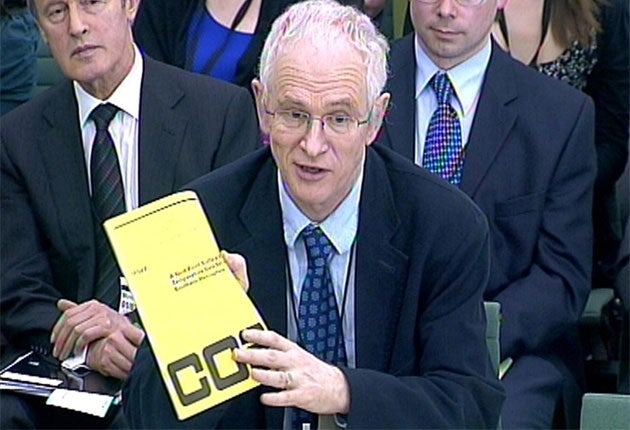Climate change scandal: MPs exonerate professor
Committee defends scientist who sent emails admitting flaws in data

Professor Phil Jones, the climate scientist at the centre of the scandal over the leak of sensitive emails from a university computer, has been largely exonerated by a powerful cross-party committee of MPs who said his scientific reputation remains intact.
There was no evidence that Professor Jones, head of the Climatic Research Unit at the University of East Anglia (UEA), deliberately withheld or manipulated data in order to support the idea that global warming was real and that it was influenced by human activities, according to a report by the Commons Science and Technology Committee.
However, the MPs criticised Professor Jones and climate scientists in general for being too possessive and secretive about the raw scientific data and computer codes they use to establish the link between global warming and human activities. They also criticised the UEA for fostering a culture of non-disclosure of scientific information to climate sceptics.
The committee's inquiry into the leak of private emails from the Climatic Research Unit (CRU) last November found no evidence to suggest that the hallowed peer review process had been subverted by Professor Jones, and no reason to question the scientific consensus that global warming is happening and that it is influenced by human activities.
However, the chairman of the committee, Phil Willis, said it was "reprehensible" that the UEA had refused to disclose information from within the CRU, a small unit of just three full-time scientists who had been inundated with dozens of Freedom of Information requests from climate sceptics.
"The focus on Professor Jones was misplaced. His actions were in line with common practices and those practices need to be changed," Mr Willis said yesterday. "There is no evidence that Jones's work has been undermined in any way... Jones has in many ways been scapegoated... people were asking him for information purely to undermine his research, but that was no excuse [not to release it]."
The select committee's report says that the media focus on Professor Jones and the CRU has been largely misplaced because his refusal to share raw data and computer codes was an approach adopted by most people in the climate science community across the world.
"We have suggested that the community consider becoming more transparent by publishing raw data and detailed methodologies. On the accusations relating to Freedom of Information, we consider that much of the responsibility should lie with UEA, not CRU," the report says.
Some of the leaked emails written by Professor Jones talked of using a "trick" to "hide the decline", which some climate sceptics have taken as proof of an attempt to hide data contradicting the idea that global warming was real. But the select committee said these phrases were references to established scientific procedures and there was no case to answer in terms of accusations of dishonesty on behalf of Professor Jones and his unit.
The MPs concluded that there is prima facie evidence that the CRU has breached the Freedom of Information Act by withholding data, but criticised the Information Commissioner's Office for making similar statements to the press without investigating the matter fully. The MPs recommend that the issue should now be investigated to clarify whether the law was breached or not.
One member of the select committee, Graham Stringer, dissented from the majority view of his colleagues, saying that their report had gone slightly further than it should have done in relation to Professor Jones and the UEA.
Join our commenting forum
Join thought-provoking conversations, follow other Independent readers and see their replies
Comments
Bookmark popover
Removed from bookmarks